人教版中考英语二轮复习 形容词和副词课件(共104张PPT)
文档属性
| 名称 | 人教版中考英语二轮复习 形容词和副词课件(共104张PPT) |  | |
| 格式 | pptx | ||
| 文件大小 | 1.6MB | ||
| 资源类型 | 教案 | ||
| 版本资源 | 人教新目标(Go for it)版 | ||
| 科目 | 英语 | ||
| 更新时间 | 2022-05-24 19:19:41 | ||
图片预览

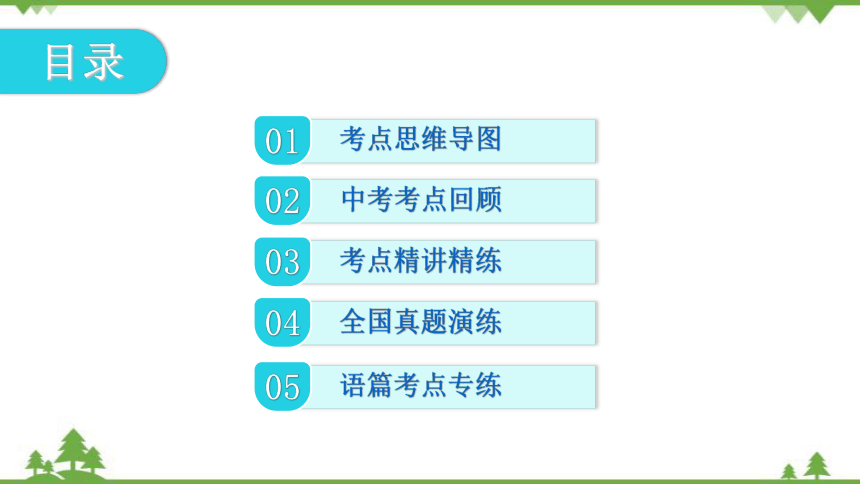
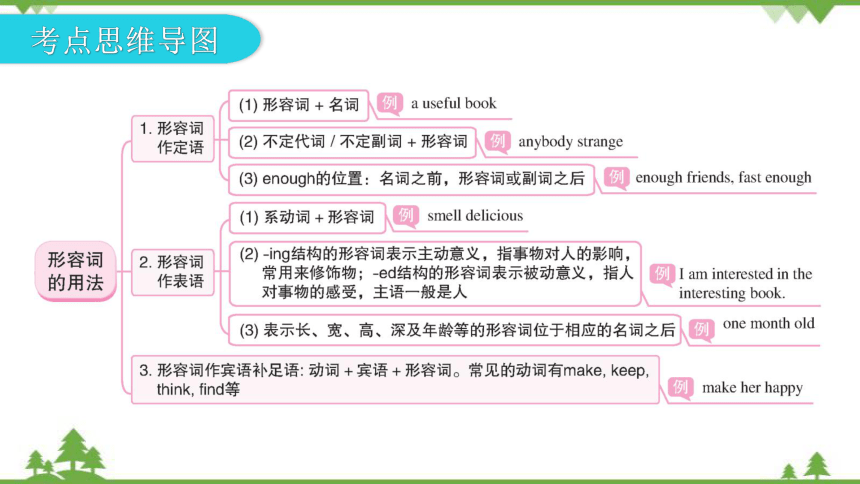
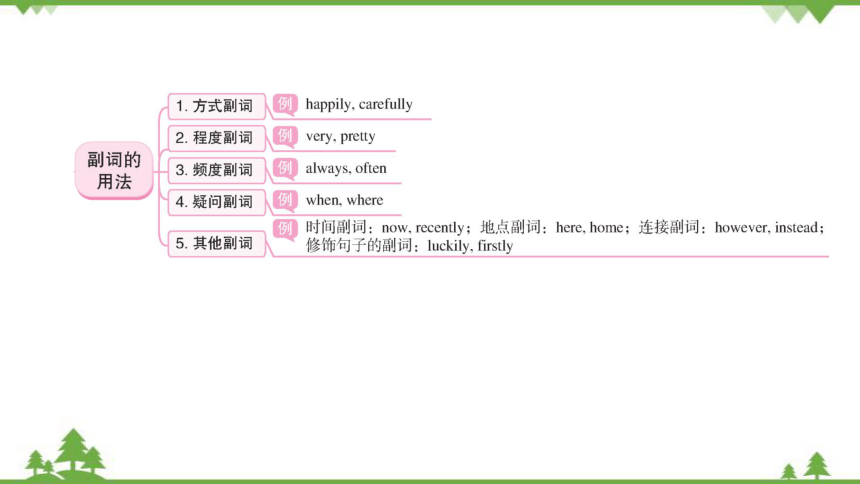
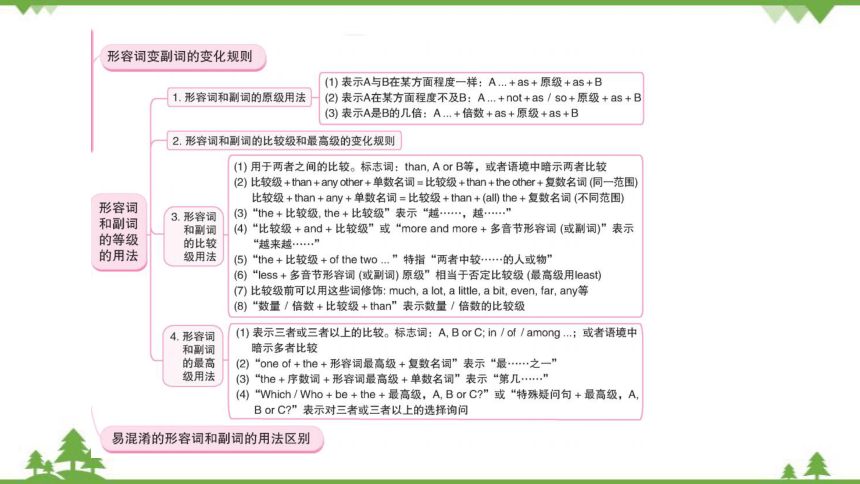
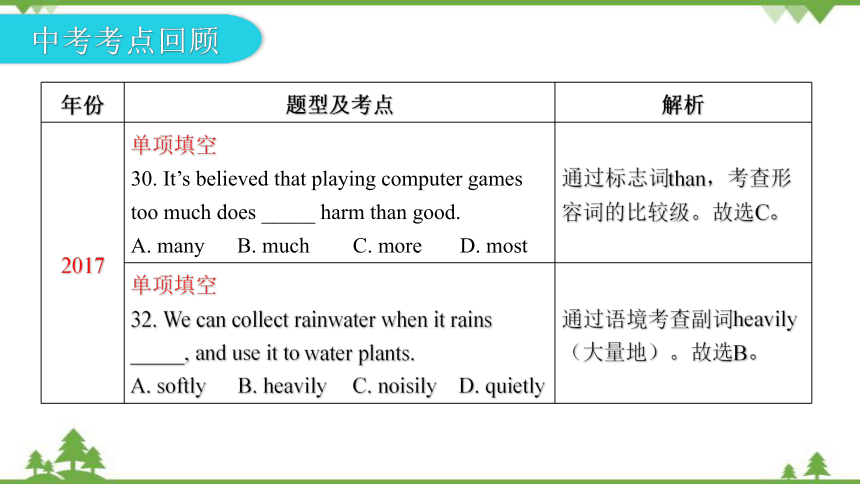
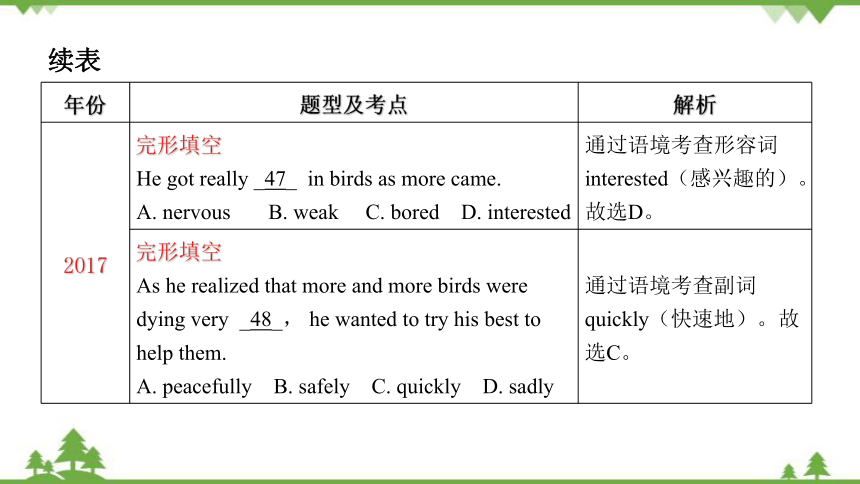
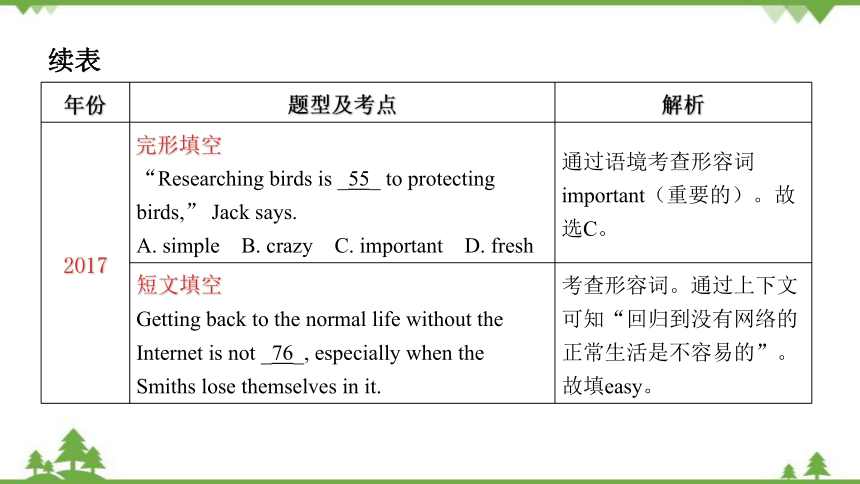

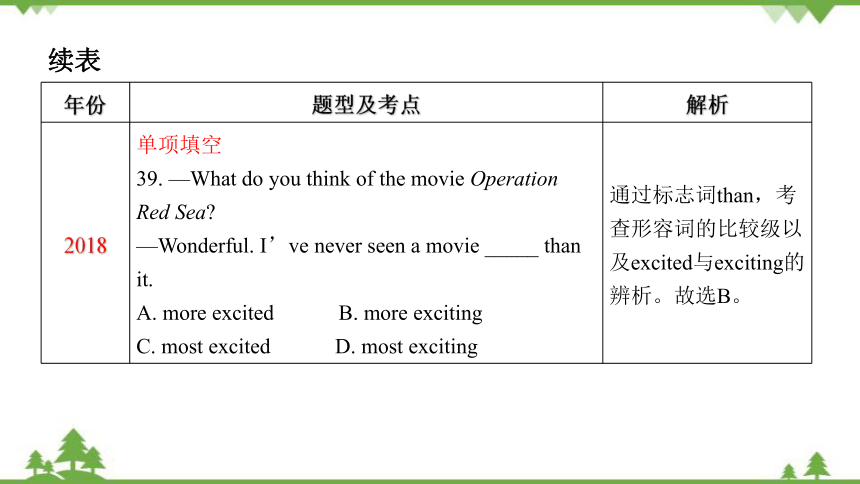
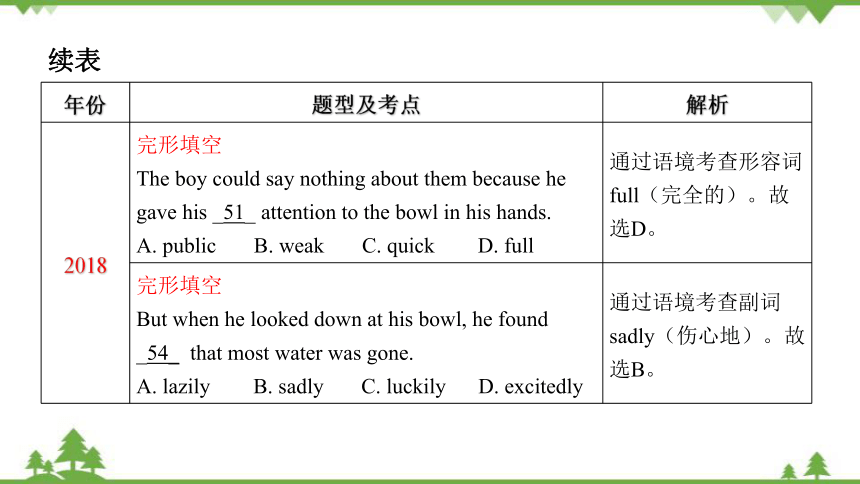
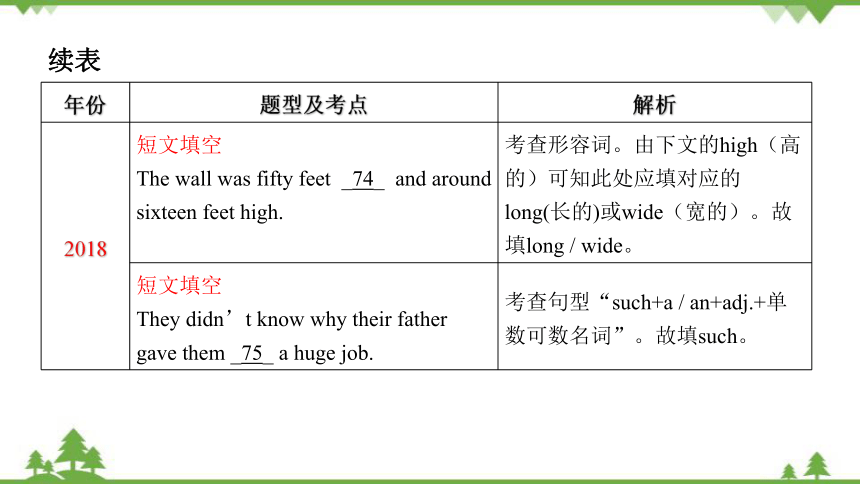
文档简介
(共104张PPT)
第一部分 基于语义的语法知识篇
第六节 形容词和副词
目录
01
考点思维导图
02
中考考点回顾
03
考点精讲精练
04
全国真题演练
05
语篇考点专练
考点思维导图
中考考点回顾
年份 题型及考点 解析
2017 单项填空 30. It’s believed that playing computer games too much does _____ harm than good. A. many B. much C. more D. most 通过标志词than,考查形容词的比较级。故选C。
单项填空 32. We can collect rainwater when it rains _____, and use it to water plants. A. softly B. heavily C. noisily D. quietly 通过语境考查副词heavily(大量地)。故选B。
年份 题型及考点 解析
2017 完形填空 He got really _47_ in birds as more came. A. nervous B. weak C. bored D. interested 通过语境考查形容词interested(感兴趣的)。故选D。
完形填空 As he realized that more and more birds were dying very _48_, he wanted to try his best to help them. A. peacefully B. safely C. quickly D. sadly
通过语境考查副词quickly(快速地)。故选C。
续表
年份 题型及考点 解析
2017 完形填空 “Researching birds is _55_ to protecting birds,” Jack says. A. simple B. crazy C. important D. fresh 通过语境考查形容词important(重要的)。故选C。
短文填空 Getting back to the normal life without the Internet is not _76_, especially when the Smiths lose themselves in it.
考查形容词。通过上下文可知“回归到没有网络的正常生活是不容易的”。故填easy。
续表
年份 题型及考点 解析
2017 短文填空 … and Mr. and Mrs. Smith need to go out shopping because they cannot buy things _79_. 考查副词。通过上下文可知“他们不能上网购物”。故填online。
2018 单项填空 36. —My grandpa practices playing the guitar _____ in the university for the elderly every day. —Cool! It’s never too old to learn. A. hard B. hardly C. great D. greatly 通过考查副词hard(努力地)以及hard与hardly的辨析。故选A。
续表
年份 题型及考点 解析
2018 单项填空 39. —What do you think of the movie Operation Red Sea —Wonderful. I’ve never seen a movie _____ than it. A. more excited B. more exciting C. most excited D. most exciting 通过标志词than,考查形容词的比较级以及excited与exciting的辨析。故选B。
续表
年份 题型及考点 解析
2018 完形填空 The boy could say nothing about them because he gave his _51_ attention to the bowl in his hands. A. public B. weak C. quick D. full 通过语境考查形容词full(完全的)。故选D。
完形填空 But when he looked down at his bowl, he found _54_ that most water was gone. A. lazily B. sadly C. luckily D. excitedly 通过语境考查副词sadly(伤心地)。故选B。
续表
年份 题型及考点 解析
2018 短文填空 The wall was fifty feet _74_ and around sixteen feet high. 考查形容词。由下文的high(高的)可知此处应填对应的long(长的)或wide(宽的)。故填long / wide。
短文填空 They didn’t know why their father gave them _75_ a huge job. 考查句型“such+a / an+adj.+单数可数名词”。故填such。
续表
年份 题型及考点 解析
2018 短文填空 _76_,with the attitude(态度) of “one brick more”,both Will and Harry rebuilt the wall … 考查副词。由上下文的转折关系以及空格后面的逗号可推断出答案。故填However。
2019 单项填空 34. Fishing is one of _____ activities among the middle-aged people. A. popular B. more popular C. most popular D. the most popular 考查句型“one+of+the+形容词最高级+复数可数名词”。故选D。
续表
年份 题型及考点 解析
2019 单项填空 39. A mobile phone with 5G can send videos much _____ than the one with 4G. A. fast B. faster C. fastest D. the fastest 通过标志词much, than,考查副词的比较级。故选B。
完形填空 But Anna didn’t have hers, and she looked _51_. A. worried B. normal C. proud D. relaxed 通过语境考查形容词worried(担忧的)。故选A。
续表
年份 题型及考点 解析
2019 完形填空 Cindy knew she should tell Mrs.Stone that she had the notebook, but she was _52_ mad at Anna. A. still B. never C. usually D. almost 通过语境考查副词still(仍然)。故选A。
完形填空 “Thank you for being _54_, Cindy. I’m sure Anna will be thankful that you have given me her notebook,” said Mrs. Stone. A. patient B. honest C. active D. quiet 通过语境考查形容词honest(诚实的)。故选B。
续表
年份 题型及考点 解析
2019 短文填空 He bought a house there over 30 years _73_,but in 2010 the village was to be pulled down. 考查副词的搭配 … years ago (……年前)。故填ago。
短文填空 One of them was a picture of Andy. He was my _76_ singer. I liked him so much … 考查形容词。由下文的I liked him so much可知“他是我最喜欢的歌手”。故填favourite / favorite。
续表
年份 题型及考点 解析
2020 语法选择 You will have a _34_ understanding of kites than before. A. good B. better C. best D. the best 通过标志词than,考查形容词的比较级。故选B。
完形填空 Small noses were very _43_ these years. A. popular B. similar C. strange D. useful 通过语境考查形容词popular(受欢迎的)。故选A。
续表
年份 题型及考点 解析
2020 完形填空 … and found that his _44_ hair no longer fit his new look. Then he wanted a change to long hair. A. long B. short C. thick D. thin 通过语境考查形容词short(短的)。故选B。
完形填空 When he was leaving, the shop keeper _45_ told him that the shop had a special offer on ears. A. silently B. foolishly C. carelessly D. suddenly 通过语境考查副词suddenly(突然地)。故选D。
续表
年份 题型及考点 解析
2020 完形填空 After that, he looked very young for his age, and _47_ different. A. probably B. hardly C. nearly D. completely 通过语境考查副词completely(完全地)。故选D。
短文填空 In a week, it made $52. Although it was only a _73_ money, she helped 12 kids with it! 考查形容词的搭配a little(一点)。故填little。
续表
年份 题型及考点 解析
2020 短文填空 Up till now, she has already raised _75_ than $17,000! 考查形容词的搭配more than(多于)。故填more。
2021 语法选择 It’s _31_ hanging bridge for walkers in the world. A. longer B. the longer C. longest D. the longest 通过关键词in the word,考查形容词的最高级。故选D。
续表
年份 题型及考点 解析
2021 语法选择 He said _40_, “I was a little afraid, but there’s no other bridge like this one in the world. It was so worth it.” A. excite B. excited C. excitedly D. excitement 考查方式副词修饰行为动词。故选C。
完形填空 Some people laughed at the funny job title, but a 9-year-old boy took the information _42_. A. simply B. lightly C. seriously D. clearly 通过语境考查副词seriously(认真地)。故选C。
续表
年份 题型及考点 解析
2021 完形填空 “Dear sirs, my name is Sam Lee. I think I am the _43_ person for the job,” he wrote … A. right B. kind C. important D. favorite 通过语境考查形容词right(适当的)。故选A。
完形填空 “Among kids, there are _50_ space scientists,” Bill told a newspaper. A. past B. future C. recent D. present 通过语境考查形容词future(未来的)。故选B。
续表
年份 题型及考点 解析
2021 短文填空 These books give the world a fuller picture of China and Lao Pan is _72_ of what he is doing. 考查形容词的搭配be proud of(为……感到骄傲)。故填proud。
续表
考点精讲精练
考点1
形容词的用法
1. 形容词作定语的用法
(1)形容词+名词。
例 a clean city 一座干净的城市,beautiful flowers 美丽的花朵
(2)不定代词/不定副词
(something/anything/nothing/somebody/somewhere …)+形容词。
例 something interesting 有趣的事,nothing new 没什么新鲜事,somewhere warm 温暖的地方
(3)enough修饰名词、形容词与副词时的位置原则:名词之前,形容词或副词之后。
例 enough friends 足够多的朋友,enough money 充足的资金(enough用作形容词,修饰名词)
strong enough 足够强大(enough用作副词,修饰形容词)
quickly enough 足够快(enough用作副词,修饰副词)
2. 形容词作表语的用法
(1)系动词+形容词。
例 look unhappy 看起来不开心,smell delicious 闻起来很美味
(2)interesting与interested, surprising与surprised, exciting与excited等作表语时的区别:-ing结构的形容词表示主动意义,指事物对人的影响,常用来修饰物;而-ed结构的形容词表示被动意义,指人对事物的感受,主语一般是人。
例 The news is exciting. 这个消息让人振奋。
We feel very excited. 我们觉得很兴奋。
(3)表示长、宽、高、深及年龄等的形容词位于相应的名词之后,为形容词词组,作表语。
例 15 years old 15岁,100 meters long 100米长
【注意】由连字符连接的合成形容词则作定语。
例 an 18-year-old boy 一个18岁的男生,a 100-meter-long bridge 一座100米长的桥
3. 形容词作宾语补足语的用法
“动词+宾语+形容词”,形容词对宾语进行补充说明,作宾语补足语。常见的动词有make, keep, think, find等。
例 make me sad 让我悲伤,keep the city tidy 保持城市整洁
( )1. —Where would you like to go with your parents this summer vacation
—We’d like to go _____ because we want to have a good rest after a long period of study and work.
A. everywhere relaxing B. somewhere relaxing
C. anywhere beautiful D. somewhere beautiful
B
( )2. Mom,the soup is not _____. A little more sugar, please.
A. salty enough B. enough salty
C. sweet enough D. enough sweet
( )3. My grandfather is over 80,but he is still in good health and stays _____.
A. safe B. warm C. awake D. active
C
D
( )4. The children were really _____ when they lay on the _____ beach.
A. relaxed; relaxing B. relaxing; relaxed
C. relaxed; relaxed D. relaxing; relaxing
( )5. More and more people will find it _____ to learn how to sort trash because it helps protect the environment.
A. meaningful B. meaningfully
C. unnecessary D. unnecessarily
A
A
考点2
副词的用法
1. 方式副词的基本用法
方式副词修饰行为动词,位置灵活,可位于谓语动词的前后,也可位于句子的首尾。常见的方式副词有:
happily, sadly, slowly, quickly, carefully, beautifully, easily, busily, comfortably, heavily, strongly, excitedly, politely, angrily, warmly等。
例 He quickly got out of the classroom. = He got quickly out of the classroom. = Quickly he got out of the classroom. = He got out of the classroom quickly. 他快速地走出了教室。
2. 程度副词的基本用法
程度副词修饰形容词或副词,位于它们之前;也可用于句末修饰动词,表示程度。常见的程度副词有:very, pretty, quite, rather, so, too, really, greatly, badly, terribly等。
例 Grandpa speaks German very/pretty/quite/really/rather well. 爷爷的德语说得特别棒。
He got badly/terribly hurt in the war. 他在战争中受了重伤。
I miss you badly/terribly. 我十分想念你。
3. 频度副词的基本用法
频度副词通常放在be 动词、情态动词和助动词之后,行为动词之前,表示做某事的频率。常见的频度副词有:always, usually, often, sometimes, hardly, hardly ever, seldom, never等。
例 I have never talked about it with anyone else. 我从未跟别人谈过这件事。
Jack usually gets angry with his mother, but seldom argues with her. 杰克经常生妈妈的气,但很少跟她吵架。
4. 疑问副词的基本用法
常用于引出特殊疑问句,询问时间(when)、地点(where)、方式(how)、原因(why)等。
例 Where do you live 你住哪儿?
Why do you like reading 你为什么喜欢阅读?
5. 其他副词的用法
(1)时间副词:now, then, soon, ago, recently, lately, later, before, early, today, tomorrow, yesterday, tonight, immediately, already, just, suddenly等。
例 It suddenly began to rain heavily. = Suddenly, it began to rain heavily. = It began to rain heavily suddenly. 突然下起了大雨。
(2)地点副词:here, there, up, down, away, nearby, home, ahead, abroad, inside, overseas, upstairs, downstairs等。
例 He lives upstairs. 他住在楼上。
He never gets home late. 他从不晚回家。
(3)连接副词:however, therefore, besides, instead, still, also, otherwise等。
例 He didn’t give up. Instead, he worked harder. 他并没有放弃。相反,他更努力了。
(4)还有一些副词用于句子开头,修饰整个句子,表达说话人的观点与态度,或事情的发展顺序。常见的有:luckily, unluckily, honestly, clearly, obviously, generally, unexpectedly, hopefully, firstly, secondly, thirdly, finally等。
例 Luckily, nobody was hurt in the accident. 幸运的是,事故中没有人受伤。
( )1. —Your son used to be a homebody but now he likes outdoor activities. How did you do that?
—I tried many ways over and over again. _____, I made it.
A. Otherwise B. However C. Finally D. Suddenly
( )2. —WeChat really influences people’s lives.
—_____. It is easier for us to keep in touch with others.
A. Mainly B. Exactly C. Simply D. Mostly
C
B
( )3. —_____ will you stay with your grandparents here?
—Nearly my whole holiday.
A. How long B. How soon C. How many D. How often
( )4. Walking is good for health. So I _____ go to school on foot.
A.hardly B. never C. seldom D. often
( )5. The Silk Road was _____ long that it passed through many countries.
A. quite B. too C. very D. so
A
D
D
考点3
形容词变副词的变化规则
规则 举例
1. 一般情况下,直接在形容词后加-ly quiet→quietly careful→carefully strong→strongly
usual→usually recent→recently sudden→suddenly
quick→quickly bad→badly beautiful→beautifully
2.以“辅音字母+le”结尾的形容词,去掉e,再加-y simple→simply gentle→gently terrible→terribly
comfortable→comfortably
续表
规则 举例
3.以“辅音字母+y”结尾的形容词,变y为i,再加-ly easy→easily happy→happily heavy→heavily
busy→busily angry→angrily
4.其他变化形式 full→fully true→truly
续表
规则 举例
5.特殊形式的形容词与副词: (1)以ly结尾的形容词:daily, lovely, lively, friendly, lonely, ugly等 (2)既可作形容词又可作副词的词:well, fast, hard, high, far, straight等 friendly people 友好的人们
a lovely boy 一个可爱的男孩
The road is very straight. Walk straight along it and you will find the bookstore on your right. 这条马路很直。沿着马路笔直走下去,你会在你的右手边找到书店。
( )1. The dancing teacher gives us instructions _____ until we are perfect in every move.
A. quick B. quickly C. patient D. patiently
( )2. The Kite Runner is a _____ book and it sells _____.
A. well; good B. good; good C. good; well D. well; well
D
C
( )3. —What time is it now
—I can’t tell you the time _____, but I know it’s too late.
A. exact B. exactly C. wise D. wisely
( )4. Most of the students in our school can do their homework _____.
A. enough careful B. careful enough
C. carefully enough D. enough carefully
B
C
( )5. When life gets _____ and you want to give up, remember that life is full of ups and downs, and without the downs, the ups would mean nothing.
A. easily B. easy C. hardly D. hard
D
1. 形容词和副词的原级用法
考点4
形容词和副词的等级的用法
用法 举例
(1)表示A与B在某方面程度一样: A …+as+原级+as+B as interesting as English 像英语一样有趣
as fast as the wind 像风一样快
My mother hopes I can be as hard-working as her. 我妈妈希望我能像她一样勤奋。
续表
用法 举例
(2)表示A在某方面程度不及B: A …+not+as/so+原级+as+B not as/so high as I jump 没有我跳得高
not as/so hot as yesterday 没有昨天热
My father doesn’t drive as/so carefully as my mother. 我爸爸开车没有我妈妈那么细心。
(3) 表示A是B的几倍: A …+倍数+as+原级+as+B This room is three times as big as that one. 这个房间是那个房间的三倍大。
Jack is 16 years old. Mike is 32 years old. So Mike is twice as old as Jack. 杰克16岁。麦克32岁。所以麦克的年龄是杰克的两倍大。
2. 形容词和副词的比较级和最高级的变化规则
(1)规则变化:
规则 举例
①一般情况下,比较级在词尾直接加-er,最高级加-est small→smaller→smallest clean→cleaner→cleanest
fresh→fresher→freshest long→longer→longest
strong→stronger→strongest tall→taller→tallest
②以不发音的字母e结尾的词,在词尾加-r构成比较级,在词尾加-st构成最高级 nice→nicer→nicest wise→wiser→wisest
late→later→latest wide→wider→widest
续表
规则 举例
③以“辅音字母+y”结尾的双音节词,变y为i,再加-er, -est构成比较级和最高级 heavy→heavier→heaviest happy→happier→happiest
easy→easier→easiest hungry→hungrier→hungriest
dirty→dirtier→dirtiest healthy→healthier→healthiest
④以一个辅音字母结尾的重读闭音节词,双写辅音字母,再加-er, -est构成比较级和最高级 big→bigger→biggest hot→hotter→hottest
fat→fatter→fattest thin→thinner→thinnest
wet→wetter→wettest
续表
规则 举例
⑤多音节词和部分双音节词,以及带有前缀或后缀的词,在词前加more, most构成比较级和最高级 often→more often→most often
tired→more tired→most tired
awkward→more awkward→most awkward
dangerous→more dangerous→most dangerous
slowly→more slowly→most slowly
(2)不规则变化:
many/much→more→most good/well→better→best
bad/badly/ill→worse→worst little→less→least
far→farther→farthest(表示空间 距离) far→further→furthest(表示程度)
old→older→oldest(强调年龄大小) old→elder→eldest(强调次第、
辈分)
3. 形容词和副词的比较级用法
用法 举例
(1)用于两者之间的比较。标志词:than,A or B等,或者语境中暗示两者比较 He is stronger than me. 他比我强壮。
Who takes study more seriously, Jim or Mike 谁学习更认真,吉姆还是麦克?
续表
用法 举例
(2)“比较级+than+any other+单数名词 =比较级+than+the other+复数名词”表示“比同一范围的任何人或物更……”,有最高级的含义 【注意】不同范围的比较则用“比较级+than+any+单数名词 = 比较级+than+(all) the+复数名词” Lucy is taller than any other student in her class. = Lucy is taller than the other students in her class. 露西比她班上的其他任何一个学生都高。
Lucy is taller than any student in Lily’s class. = Lucy is taller than (all) the students in Lily’s class. 露西比莉莉班上的所有学生都高。
续表
用法 举例
(3)“the+比较级, the+比较级”表示 “越……,越……” The more he reads, the better he likes reading. 书读得越多,他越热爱阅读。
The more careful you are, the fewer mistakes you will make. 你越细心,犯错就会越少。
(4)“比较级+and+比较级”或“more and more+多音节形容词(或副词)”表示 “越来越……” He is taller and taller. 他越来越高了。
Our school is getting more and more beautiful. 我们的学校变得越来越美丽。
续表
用法 举例
(5)“the+比较级+of the two …”特指“两者中较……的人或物” I want to buy the longer one of the two rulers. 我想买两把尺子中较长的那把。
Of the two boys, the taller one is from France. 这两个男孩中,较高的那个来自法国。
续表
用法 举例
(6)“A+谓语动词+less+多音节形容词(或副词)原级+than+B”,相当于多音节形容词(或副词)的否定比较级(最高级用least),表示“A不及B那么……;A没有B那么……” The first story is less interesting than the second one. = The first story is not as/so interesting as the second one. = The second story is more interesting than the first one. 第一个故事没有第二个故事那么有趣。
续表
用法 举例
(7)形容词、副词的比较级前可以用这些词修饰: much, a lot, a little, a bit, even, far, any等 【注意】quite, very, rather, so, too, enough一般修饰原级 He is much/a lot taller than before. 他比以前高多了。
He is quite interested in playing soccer. 他对踢足球相当感兴趣。
续表
用法 举例
(8)“A+谓语动词+数量/倍数+比较级+than+B”表示数量/倍数的比较级 I’m 15 and my sister is 13. I’m two years older than her. 我15岁,我妹妹13岁。我比她大两岁。
Mike is once older than Jack.=Mike is twice as old as Jack. 麦克比杰克大(年长)一倍。=麦克的年龄是杰克的两倍大。
4. 形容词和副词的最高级用法
用法 举例
(1)表示三者或三者以上的比较。标志词:A, B or C; in/of/among …;或者语境中暗示多者比较(形容词最高级前要用the, 副词最高级前可以省略the) 【注意】最高级所带的比较范围:如果范围与主语同类则用of或among,如果不同类则用in Which do you think is the most difficult, English, Chinese or math 英语、语文与数学,你认为哪一科最难?
Mike studies hardest of / among the students.麦克是这些学生中学习最勤奋的。(麦克也是学生)
Mike studies hardest in the class. 麦克是这个班上学习最勤奋的。(麦克不是班级)
续表
用法 举例
(2)“one of+the+形容词最高级+复数名词”表示 “最……之一” He is one of the most popular singers in the world. 他是世界上最受欢迎的歌手之一。
She is one of the tallest girls in our school. 她是我们学校里最高的女孩之一。
(3)“the+序数词+形容词最高级+单数名词”表示“第几……” China is the third largest country in the world. 中国是世界上第三大的国家。
The Amazon River is the second longest river in the world. 亚马孙河是世界上第二长的河流。
续表
用法 举例
(4)“Which / Who+be+the+最高级,A, B or C ”或“特殊疑问句+最高级,A, B or C ”表示对三者或三者以上的选择询问 Who is the tallest boy, Tom, Mike or John 谁是最高的男孩,汤姆、迈克还是约翰?
Which do you like best, coffee, tea or juice 你最喜欢哪一种,咖啡、茶还是果汁?
( )1. My father caught a big fish this morning, but I caught a _____ one. I felt great!
A. smaller B. smallest C. bigger D. biggest
( )2. —Everyone knows Canada is the second largest country in the world.
—Yes. That is, it is larger than _____ country in Asia.
A. any B. any other C. other D. another
C
A
( )3. —Roy never likes junk food.
—Neither do I. That’s probably why I’m becoming _____ now.
A. healthy and weak B. healthier and healthier
C. weaker and weaker D. more and more healthily
( )4. Of the two students, Masha is _____ one. She can always come up with new ideas.
A. more creative B. the more creative
C. most creative D. the most creative
B
B
( )5. Of the two math problems, I can just work out _____ one.
A. the less difficult B. more difficult
C. the more difficult D. less difficult
( )6. —The picture is, I have to say, not a bit beautiful.
—Why It’s _____ than the pictures I have ever seen.
A. far more beautiful B. much less beautiful
C. no more beautiful D. any less beautiful
A
A
( )7. —Is your father strict with you
—Yes. He takes my grades as _____ as my teachers do.
A. serious B. more serious C. seriously D. more seriously
( )8. —Do you know that China is one of _____ countries in the world
—Yes, I do. It’s much _____ than the US.
A. oldest; older B. the oldest; older
C. the oldest; elder D. the older; elder
C
B
( )9. Protecting ourselves is one of _____ things we must do.
A. important B. more important
C. most important D. the most important
( )10. The Yangtze River, the longest river in China, is the third _____ in the world.
A. long B. longer C. longest D. the longest
D
C
考点5
易混淆的形容词和副词的用法区别
1. alone, lonely
例 The old man lives alone in a lonely house, but he never feels lonely. 这位老人独自住在一间荒凉的房子里,但是他从来不觉得孤单。
2. good, well
例 He is a good player. He can play basketball very well. 他是一位优秀的运动员。他的篮球打得很好。
3. interest, interesting, interested
例 My elder brother has many interests. He is interested in e-sports most. He thinks it is interesting. 我哥哥有很多兴趣。他对电子竞技最感兴趣。他认为它很有趣。
4. hard, hardly
例 He works hard. 他工作勤奋。
Hard work makes us smart. 勤奋使人智慧。
It rained hard last night. 昨晚下了大雨。
It hardly rains in the winter of South China. 中国南部地区冬天几乎不下雨。
5. sometimes, some times,sometime, some time
例 Sometimes he comes by bike and sometimes on foot. 他有时骑车来,有时走路来。
John has been to Peking University some times. 约翰去过北京大学几次了。
I saw him sometime in May. 我在5月的某个时候见过他。
I will stay in Beijing for some time. 我将在北京待上一段时间。
6. much too, too much, too many
例 There is too much rain in the spring of Guangdong. It makes everything much too wet. And too many people are annoyed at that. 广东的春天雨水太多,弄得所有的东西都太潮湿了。太多人都烦这一点。
7. so, such(两者都表示“如此;这样”)
例 The man is so bad that nobody likes him. = He is such a bad man that nobody likes him. 这个人太坏,以至于没人喜欢他。
There are so many people in the park. 公园里太多人了。
8. either, too, also(三者都表示“也”)
例 He doesn’t like junk food. I don’t (like junk food), either. 他不喜欢垃圾食品,我也不喜欢(垃圾食品)。
He likes English. I like English, too. 他喜欢英语,我也喜欢英语。
She is my mother and she is also my best friend. 她是我的妈妈,也是我最好的朋友。
9. black, dark
例 Please paint the door black. 请把门刷成黑色。
It’s getting dark. 天色渐渐暗了。
10. high, tall
例 The temperature is higher today than it was yesterday. 今天的温度比昨天高。
There are many tall trees around our school. 我们学校的周围有很多高高的树。
【注意】指楼房高既可以用tall, 也可以用high。
11. real, true
例 It’s not a real flower. 那不是一朵真花。
It’s true that she has won the Nobel Prize. 她的确获得了诺贝尔奖。
12. fast, quickly, soon
例 He gets home as fast as he can every day to help his mother do housework. 他每天都尽快回家帮他妈妈做家务。
He stood up and answered my question quickly. 他站起来,迅速地回答了我的问题。
Don’t worry. The meeting will be over soon. 别担心,会议很快就会结束。
( )1. Although they could _____ speak Chinese, they traveled nearly all over China and made many Chinese friends.
A. hard B. hardly C. gentle D. gently
( )2. My uncle will come to Dongguan _____ next week. He says he will stay here for _____.
A. sometimes; sometime B. sometime; some time
C. some time; sometimes D. some times; sometimes
B
B
( )3. It’s not safe for children, especially girls, to go home _____ at night.
A. alone B. lonely C. straight D. lately
( )4. —I have never watched any Italy’s movies before.
—I haven’t, _____.
A. also B. too C. either D. neither
A
C
C
( )5. The streets are _____ crowded these days because there are _____ private cars. I hope more people would choose public transportation to go out.
A. too many; much too B. too much; much too
C. much too; too many D. much too; too much
编者按 更多形容词和副词辨析及短语归纳可见于《中考高频词汇突破》,并建议结合《早读本》进行记忆
全国真题演练
( )1. —You want to lose weight But why You look quite slim to me.
—That may be true. But I’m _____ than last year. (2021 无锡)
A. much heavier B. heavy enough
C. much lighter D. light enough
( )2. Many of the older buildings in our city now look beautiful because workers have _____ made them look as good as new. (2021 南京)
A. carelessly B. hardly C. nervously D. carefully
A
D
( )3. —What’s _____ mountain in the world
—Qomolangma. It is 8848.86 meters high according to the latest report. (2021 遂宁)
A. higher B. highest C. the highest D. high
( )4. Please be polite and _____ offer your seat to people who need it.(2021 河北)
A. never B. seldom C. sometimes D. always
C
D
( )5. Jogging is _____ than many sports—to start, just get some comfortable sports clothes and good running shoes. (2021 南京)
A. cheap B. cheaper C. cheapest D. the cheapest
( )6. —Fishing is one of _____ activities among many people.
—Yes. But now it’s not allowed to fish in the Yangtze River as well as other rivers. (2021 泸州)
A. popular B. more popular
C. most popular D. the most popular
B
D
( )7. —Which country has a _____ population, China or Canada
—China. Canada is a lot _____ crowded than China. (2021 达州)
A. bigger; less B. bigger; more
C. smaller; less D. smaller; more
( )8. I think there’s no need to buy such an expensive coat for a kid. I’d like a _____ one. (2021 广元)
A. cheap B. cheaper C. cheapest D. lower
A
B
( )9. There had been no rain for a long time. The farmer felt very _____. (2021 广州)
A. sad B. sadder C. sadly D. sadness
( )10. It’s unbelievable that mountains can grow. According to a recent survey, Qomolangma has risen ____ than before.(2021 昆明)
A. low B. lower C. high D. higher
A
D
一、语法选择
Jane and Maggie are our new teachers in Grade 9. Both of them are kind, patient and strict. However, they also have _1_.
On the one hand, Jane is _2_ funny that she always makes us happy in her class. We feel relaxed in her class. But when we don’t study _3_, she will become serious. She is strict with us and she is even _4_ in her job. She is one of _5_ teachers in our school. Thanks to Jane, we find it _6_ to study English.
语篇考点专练
something different
so
hard
stricter
the best
interesting
On the other hand, Maggie is _7_, so she has enough friends in our class. She is very popular among us. She is the first _8_ woman teacher in our school and she does well in sports. Maggie is also a careful lady. She always checks our homework very _9_.
We love both Maggie and Jane and we hope they will keep _10_ all the time. Maybe, we will come back to see them sometime in the future.
friendly enough
tallest
carefully
healthy
( )1. A. different something B. something different
C. different nothing D. nothing different
( )2. A. very B. quite C. so D. such
( )3. A. hard B. harder C. hardest D. hardly
( )4. A. strict B. stricter C. strictest D. the strictest
( )5. A. well B. good C. better D. the best
B
C
A
B
D
( )6. A. interested B. interesting
C. interest D. interests
( )7. A. enough friend B. friend enough
C. friendly enough D. enough friendly
( )8. A. tall B. taller C. tallest D. the tallest
( )9. A. carefully B. more carefully
C. careful D. more careful
( )10. A. health B. healthy C. healthier D. healthily
B
C
C
A
B
二、完形填空
Once there was a baby eagle(鹰)living in a nest on a cliff(山崖). He loved his _1_ nest. Here he had all love and attention that a great mother eagle could provide. Many times each day, the mother would come and fill him with _2_ food he liked.
comfortable
delicious
The baby eagle grew strong day by day and felt _3_ all the time until one day, his mother stopped coming to the nest. The baby eagle cried and cried, but nobody could hear him.
Then one day the mother eagle appeared _4_ at the top of the cliff again. She looked down at her baby and said, “Here is some tasty food. All you have to do is come _5_ and get it.”
“But how ” The baby eagle cried out _6_. “I can’t do that. Please come down here!”
happy
seriously
bravely
sadly
Hearing this, his mother flew fast down and pushed him out of the nest.
The baby eagle fell down, head first. “How can you put me down Now I am sure to die! I hate you!” He shouted at his mother _7_.
The ground rushed _8_, faster and faster. The baby eagle started to flap his wings as he screamed with fear. Then something _9_ happened. The air caught behind his wings and he
angrily
closer
strange
wasn’t moving to the ground any more. Instead, his eyes were pointed up at the sun. “What’s going on here ” he asked.
“You are flying! Finally you have made it!” His mother was very _10_ to see this.
pleased
( )1. A. different B. comfortable C. modern D. expensive
( )2. A. delicious B. hot C. cool D. terrible
( )3. A. nervous B. sad C. happy D. surprised
( )4. A. seriously B. carefully
C. unhappily D. strongly
( )5. A. quietly B. quickly C. bravely D. worriedly
B
A
C
A
C
( )6. A. excitedly B. amazingly C. heavily D. sadly
( )7. A. joyfully B. happily C. busily D. angrily
( )8. A. smaller B. longer C. thicker D. closer
( )9. A. strange B. strong C. simple D. serious
( )10. A. pleased B. afraid C. angry D. poor
D
D
D
A
A
三、短文填空
Chinese dishes are very _1_ in the north and south. But in most parts of China, there is one kind of food in common. It is baozi, one of the most popular dishes in China.
Baozi is made in different sizes. The smallest kind is xiaolongbao. Each one is as _2_ as a ping-pong ball. The fillings of baozi are _3_ different. Usually baozi is filled with vegetables
different
small
also
or pork. In the south, many people also put _4_ fillings such as sugar in baozi. Some baozi even have soup inside. People drink the soup before eating the baozi. Some people think it’s _5_ to make this kind of baozi. But in fact, it’s very easy. _6_, we put a jelly (胶冻) of gravy(肉汁) inside a baozi. Next, we put the baozi in a pot on a fire. Later, when the baozi gets _7_, the jelly turns into soup.
sweet / other
difficult / hard
First / Firstly
hot
Baozi is an important kind of traditional food to _8_ people. Not only Chinese but also many foreigners like baozi. They call them Chinese dumplings, the _9_ name as jiaozi. Have you tried baozi before Is it _10_ or bad for you to eat Welcome to share your idea with us.
Chinese
same
good / delicious
1. _____________ 2. ______________
3. _____________ 4. ______________
5. _____________ 6. ______________
7. _____________ 8. ______________
9. _____________ 10. _____________
different
small
also
sweet / other
difficult / hard
First / Firstly
hot
Chinese
same
good / delicious
谢 谢!
第一部分 基于语义的语法知识篇
第六节 形容词和副词
目录
01
考点思维导图
02
中考考点回顾
03
考点精讲精练
04
全国真题演练
05
语篇考点专练
考点思维导图
中考考点回顾
年份 题型及考点 解析
2017 单项填空 30. It’s believed that playing computer games too much does _____ harm than good. A. many B. much C. more D. most 通过标志词than,考查形容词的比较级。故选C。
单项填空 32. We can collect rainwater when it rains _____, and use it to water plants. A. softly B. heavily C. noisily D. quietly 通过语境考查副词heavily(大量地)。故选B。
年份 题型及考点 解析
2017 完形填空 He got really _47_ in birds as more came. A. nervous B. weak C. bored D. interested 通过语境考查形容词interested(感兴趣的)。故选D。
完形填空 As he realized that more and more birds were dying very _48_, he wanted to try his best to help them. A. peacefully B. safely C. quickly D. sadly
通过语境考查副词quickly(快速地)。故选C。
续表
年份 题型及考点 解析
2017 完形填空 “Researching birds is _55_ to protecting birds,” Jack says. A. simple B. crazy C. important D. fresh 通过语境考查形容词important(重要的)。故选C。
短文填空 Getting back to the normal life without the Internet is not _76_, especially when the Smiths lose themselves in it.
考查形容词。通过上下文可知“回归到没有网络的正常生活是不容易的”。故填easy。
续表
年份 题型及考点 解析
2017 短文填空 … and Mr. and Mrs. Smith need to go out shopping because they cannot buy things _79_. 考查副词。通过上下文可知“他们不能上网购物”。故填online。
2018 单项填空 36. —My grandpa practices playing the guitar _____ in the university for the elderly every day. —Cool! It’s never too old to learn. A. hard B. hardly C. great D. greatly 通过考查副词hard(努力地)以及hard与hardly的辨析。故选A。
续表
年份 题型及考点 解析
2018 单项填空 39. —What do you think of the movie Operation Red Sea —Wonderful. I’ve never seen a movie _____ than it. A. more excited B. more exciting C. most excited D. most exciting 通过标志词than,考查形容词的比较级以及excited与exciting的辨析。故选B。
续表
年份 题型及考点 解析
2018 完形填空 The boy could say nothing about them because he gave his _51_ attention to the bowl in his hands. A. public B. weak C. quick D. full 通过语境考查形容词full(完全的)。故选D。
完形填空 But when he looked down at his bowl, he found _54_ that most water was gone. A. lazily B. sadly C. luckily D. excitedly 通过语境考查副词sadly(伤心地)。故选B。
续表
年份 题型及考点 解析
2018 短文填空 The wall was fifty feet _74_ and around sixteen feet high. 考查形容词。由下文的high(高的)可知此处应填对应的long(长的)或wide(宽的)。故填long / wide。
短文填空 They didn’t know why their father gave them _75_ a huge job. 考查句型“such+a / an+adj.+单数可数名词”。故填such。
续表
年份 题型及考点 解析
2018 短文填空 _76_,with the attitude(态度) of “one brick more”,both Will and Harry rebuilt the wall … 考查副词。由上下文的转折关系以及空格后面的逗号可推断出答案。故填However。
2019 单项填空 34. Fishing is one of _____ activities among the middle-aged people. A. popular B. more popular C. most popular D. the most popular 考查句型“one+of+the+形容词最高级+复数可数名词”。故选D。
续表
年份 题型及考点 解析
2019 单项填空 39. A mobile phone with 5G can send videos much _____ than the one with 4G. A. fast B. faster C. fastest D. the fastest 通过标志词much, than,考查副词的比较级。故选B。
完形填空 But Anna didn’t have hers, and she looked _51_. A. worried B. normal C. proud D. relaxed 通过语境考查形容词worried(担忧的)。故选A。
续表
年份 题型及考点 解析
2019 完形填空 Cindy knew she should tell Mrs.Stone that she had the notebook, but she was _52_ mad at Anna. A. still B. never C. usually D. almost 通过语境考查副词still(仍然)。故选A。
完形填空 “Thank you for being _54_, Cindy. I’m sure Anna will be thankful that you have given me her notebook,” said Mrs. Stone. A. patient B. honest C. active D. quiet 通过语境考查形容词honest(诚实的)。故选B。
续表
年份 题型及考点 解析
2019 短文填空 He bought a house there over 30 years _73_,but in 2010 the village was to be pulled down. 考查副词的搭配 … years ago (……年前)。故填ago。
短文填空 One of them was a picture of Andy. He was my _76_ singer. I liked him so much … 考查形容词。由下文的I liked him so much可知“他是我最喜欢的歌手”。故填favourite / favorite。
续表
年份 题型及考点 解析
2020 语法选择 You will have a _34_ understanding of kites than before. A. good B. better C. best D. the best 通过标志词than,考查形容词的比较级。故选B。
完形填空 Small noses were very _43_ these years. A. popular B. similar C. strange D. useful 通过语境考查形容词popular(受欢迎的)。故选A。
续表
年份 题型及考点 解析
2020 完形填空 … and found that his _44_ hair no longer fit his new look. Then he wanted a change to long hair. A. long B. short C. thick D. thin 通过语境考查形容词short(短的)。故选B。
完形填空 When he was leaving, the shop keeper _45_ told him that the shop had a special offer on ears. A. silently B. foolishly C. carelessly D. suddenly 通过语境考查副词suddenly(突然地)。故选D。
续表
年份 题型及考点 解析
2020 完形填空 After that, he looked very young for his age, and _47_ different. A. probably B. hardly C. nearly D. completely 通过语境考查副词completely(完全地)。故选D。
短文填空 In a week, it made $52. Although it was only a _73_ money, she helped 12 kids with it! 考查形容词的搭配a little(一点)。故填little。
续表
年份 题型及考点 解析
2020 短文填空 Up till now, she has already raised _75_ than $17,000! 考查形容词的搭配more than(多于)。故填more。
2021 语法选择 It’s _31_ hanging bridge for walkers in the world. A. longer B. the longer C. longest D. the longest 通过关键词in the word,考查形容词的最高级。故选D。
续表
年份 题型及考点 解析
2021 语法选择 He said _40_, “I was a little afraid, but there’s no other bridge like this one in the world. It was so worth it.” A. excite B. excited C. excitedly D. excitement 考查方式副词修饰行为动词。故选C。
完形填空 Some people laughed at the funny job title, but a 9-year-old boy took the information _42_. A. simply B. lightly C. seriously D. clearly 通过语境考查副词seriously(认真地)。故选C。
续表
年份 题型及考点 解析
2021 完形填空 “Dear sirs, my name is Sam Lee. I think I am the _43_ person for the job,” he wrote … A. right B. kind C. important D. favorite 通过语境考查形容词right(适当的)。故选A。
完形填空 “Among kids, there are _50_ space scientists,” Bill told a newspaper. A. past B. future C. recent D. present 通过语境考查形容词future(未来的)。故选B。
续表
年份 题型及考点 解析
2021 短文填空 These books give the world a fuller picture of China and Lao Pan is _72_ of what he is doing. 考查形容词的搭配be proud of(为……感到骄傲)。故填proud。
续表
考点精讲精练
考点1
形容词的用法
1. 形容词作定语的用法
(1)形容词+名词。
例 a clean city 一座干净的城市,beautiful flowers 美丽的花朵
(2)不定代词/不定副词
(something/anything/nothing/somebody/somewhere …)+形容词。
例 something interesting 有趣的事,nothing new 没什么新鲜事,somewhere warm 温暖的地方
(3)enough修饰名词、形容词与副词时的位置原则:名词之前,形容词或副词之后。
例 enough friends 足够多的朋友,enough money 充足的资金(enough用作形容词,修饰名词)
strong enough 足够强大(enough用作副词,修饰形容词)
quickly enough 足够快(enough用作副词,修饰副词)
2. 形容词作表语的用法
(1)系动词+形容词。
例 look unhappy 看起来不开心,smell delicious 闻起来很美味
(2)interesting与interested, surprising与surprised, exciting与excited等作表语时的区别:-ing结构的形容词表示主动意义,指事物对人的影响,常用来修饰物;而-ed结构的形容词表示被动意义,指人对事物的感受,主语一般是人。
例 The news is exciting. 这个消息让人振奋。
We feel very excited. 我们觉得很兴奋。
(3)表示长、宽、高、深及年龄等的形容词位于相应的名词之后,为形容词词组,作表语。
例 15 years old 15岁,100 meters long 100米长
【注意】由连字符连接的合成形容词则作定语。
例 an 18-year-old boy 一个18岁的男生,a 100-meter-long bridge 一座100米长的桥
3. 形容词作宾语补足语的用法
“动词+宾语+形容词”,形容词对宾语进行补充说明,作宾语补足语。常见的动词有make, keep, think, find等。
例 make me sad 让我悲伤,keep the city tidy 保持城市整洁
( )1. —Where would you like to go with your parents this summer vacation
—We’d like to go _____ because we want to have a good rest after a long period of study and work.
A. everywhere relaxing B. somewhere relaxing
C. anywhere beautiful D. somewhere beautiful
B
( )2. Mom,the soup is not _____. A little more sugar, please.
A. salty enough B. enough salty
C. sweet enough D. enough sweet
( )3. My grandfather is over 80,but he is still in good health and stays _____.
A. safe B. warm C. awake D. active
C
D
( )4. The children were really _____ when they lay on the _____ beach.
A. relaxed; relaxing B. relaxing; relaxed
C. relaxed; relaxed D. relaxing; relaxing
( )5. More and more people will find it _____ to learn how to sort trash because it helps protect the environment.
A. meaningful B. meaningfully
C. unnecessary D. unnecessarily
A
A
考点2
副词的用法
1. 方式副词的基本用法
方式副词修饰行为动词,位置灵活,可位于谓语动词的前后,也可位于句子的首尾。常见的方式副词有:
happily, sadly, slowly, quickly, carefully, beautifully, easily, busily, comfortably, heavily, strongly, excitedly, politely, angrily, warmly等。
例 He quickly got out of the classroom. = He got quickly out of the classroom. = Quickly he got out of the classroom. = He got out of the classroom quickly. 他快速地走出了教室。
2. 程度副词的基本用法
程度副词修饰形容词或副词,位于它们之前;也可用于句末修饰动词,表示程度。常见的程度副词有:very, pretty, quite, rather, so, too, really, greatly, badly, terribly等。
例 Grandpa speaks German very/pretty/quite/really/rather well. 爷爷的德语说得特别棒。
He got badly/terribly hurt in the war. 他在战争中受了重伤。
I miss you badly/terribly. 我十分想念你。
3. 频度副词的基本用法
频度副词通常放在be 动词、情态动词和助动词之后,行为动词之前,表示做某事的频率。常见的频度副词有:always, usually, often, sometimes, hardly, hardly ever, seldom, never等。
例 I have never talked about it with anyone else. 我从未跟别人谈过这件事。
Jack usually gets angry with his mother, but seldom argues with her. 杰克经常生妈妈的气,但很少跟她吵架。
4. 疑问副词的基本用法
常用于引出特殊疑问句,询问时间(when)、地点(where)、方式(how)、原因(why)等。
例 Where do you live 你住哪儿?
Why do you like reading 你为什么喜欢阅读?
5. 其他副词的用法
(1)时间副词:now, then, soon, ago, recently, lately, later, before, early, today, tomorrow, yesterday, tonight, immediately, already, just, suddenly等。
例 It suddenly began to rain heavily. = Suddenly, it began to rain heavily. = It began to rain heavily suddenly. 突然下起了大雨。
(2)地点副词:here, there, up, down, away, nearby, home, ahead, abroad, inside, overseas, upstairs, downstairs等。
例 He lives upstairs. 他住在楼上。
He never gets home late. 他从不晚回家。
(3)连接副词:however, therefore, besides, instead, still, also, otherwise等。
例 He didn’t give up. Instead, he worked harder. 他并没有放弃。相反,他更努力了。
(4)还有一些副词用于句子开头,修饰整个句子,表达说话人的观点与态度,或事情的发展顺序。常见的有:luckily, unluckily, honestly, clearly, obviously, generally, unexpectedly, hopefully, firstly, secondly, thirdly, finally等。
例 Luckily, nobody was hurt in the accident. 幸运的是,事故中没有人受伤。
( )1. —Your son used to be a homebody but now he likes outdoor activities. How did you do that?
—I tried many ways over and over again. _____, I made it.
A. Otherwise B. However C. Finally D. Suddenly
( )2. —WeChat really influences people’s lives.
—_____. It is easier for us to keep in touch with others.
A. Mainly B. Exactly C. Simply D. Mostly
C
B
( )3. —_____ will you stay with your grandparents here?
—Nearly my whole holiday.
A. How long B. How soon C. How many D. How often
( )4. Walking is good for health. So I _____ go to school on foot.
A.hardly B. never C. seldom D. often
( )5. The Silk Road was _____ long that it passed through many countries.
A. quite B. too C. very D. so
A
D
D
考点3
形容词变副词的变化规则
规则 举例
1. 一般情况下,直接在形容词后加-ly quiet→quietly careful→carefully strong→strongly
usual→usually recent→recently sudden→suddenly
quick→quickly bad→badly beautiful→beautifully
2.以“辅音字母+le”结尾的形容词,去掉e,再加-y simple→simply gentle→gently terrible→terribly
comfortable→comfortably
续表
规则 举例
3.以“辅音字母+y”结尾的形容词,变y为i,再加-ly easy→easily happy→happily heavy→heavily
busy→busily angry→angrily
4.其他变化形式 full→fully true→truly
续表
规则 举例
5.特殊形式的形容词与副词: (1)以ly结尾的形容词:daily, lovely, lively, friendly, lonely, ugly等 (2)既可作形容词又可作副词的词:well, fast, hard, high, far, straight等 friendly people 友好的人们
a lovely boy 一个可爱的男孩
The road is very straight. Walk straight along it and you will find the bookstore on your right. 这条马路很直。沿着马路笔直走下去,你会在你的右手边找到书店。
( )1. The dancing teacher gives us instructions _____ until we are perfect in every move.
A. quick B. quickly C. patient D. patiently
( )2. The Kite Runner is a _____ book and it sells _____.
A. well; good B. good; good C. good; well D. well; well
D
C
( )3. —What time is it now
—I can’t tell you the time _____, but I know it’s too late.
A. exact B. exactly C. wise D. wisely
( )4. Most of the students in our school can do their homework _____.
A. enough careful B. careful enough
C. carefully enough D. enough carefully
B
C
( )5. When life gets _____ and you want to give up, remember that life is full of ups and downs, and without the downs, the ups would mean nothing.
A. easily B. easy C. hardly D. hard
D
1. 形容词和副词的原级用法
考点4
形容词和副词的等级的用法
用法 举例
(1)表示A与B在某方面程度一样: A …+as+原级+as+B as interesting as English 像英语一样有趣
as fast as the wind 像风一样快
My mother hopes I can be as hard-working as her. 我妈妈希望我能像她一样勤奋。
续表
用法 举例
(2)表示A在某方面程度不及B: A …+not+as/so+原级+as+B not as/so high as I jump 没有我跳得高
not as/so hot as yesterday 没有昨天热
My father doesn’t drive as/so carefully as my mother. 我爸爸开车没有我妈妈那么细心。
(3) 表示A是B的几倍: A …+倍数+as+原级+as+B This room is three times as big as that one. 这个房间是那个房间的三倍大。
Jack is 16 years old. Mike is 32 years old. So Mike is twice as old as Jack. 杰克16岁。麦克32岁。所以麦克的年龄是杰克的两倍大。
2. 形容词和副词的比较级和最高级的变化规则
(1)规则变化:
规则 举例
①一般情况下,比较级在词尾直接加-er,最高级加-est small→smaller→smallest clean→cleaner→cleanest
fresh→fresher→freshest long→longer→longest
strong→stronger→strongest tall→taller→tallest
②以不发音的字母e结尾的词,在词尾加-r构成比较级,在词尾加-st构成最高级 nice→nicer→nicest wise→wiser→wisest
late→later→latest wide→wider→widest
续表
规则 举例
③以“辅音字母+y”结尾的双音节词,变y为i,再加-er, -est构成比较级和最高级 heavy→heavier→heaviest happy→happier→happiest
easy→easier→easiest hungry→hungrier→hungriest
dirty→dirtier→dirtiest healthy→healthier→healthiest
④以一个辅音字母结尾的重读闭音节词,双写辅音字母,再加-er, -est构成比较级和最高级 big→bigger→biggest hot→hotter→hottest
fat→fatter→fattest thin→thinner→thinnest
wet→wetter→wettest
续表
规则 举例
⑤多音节词和部分双音节词,以及带有前缀或后缀的词,在词前加more, most构成比较级和最高级 often→more often→most often
tired→more tired→most tired
awkward→more awkward→most awkward
dangerous→more dangerous→most dangerous
slowly→more slowly→most slowly
(2)不规则变化:
many/much→more→most good/well→better→best
bad/badly/ill→worse→worst little→less→least
far→farther→farthest(表示空间 距离) far→further→furthest(表示程度)
old→older→oldest(强调年龄大小) old→elder→eldest(强调次第、
辈分)
3. 形容词和副词的比较级用法
用法 举例
(1)用于两者之间的比较。标志词:than,A or B等,或者语境中暗示两者比较 He is stronger than me. 他比我强壮。
Who takes study more seriously, Jim or Mike 谁学习更认真,吉姆还是麦克?
续表
用法 举例
(2)“比较级+than+any other+单数名词 =比较级+than+the other+复数名词”表示“比同一范围的任何人或物更……”,有最高级的含义 【注意】不同范围的比较则用“比较级+than+any+单数名词 = 比较级+than+(all) the+复数名词” Lucy is taller than any other student in her class. = Lucy is taller than the other students in her class. 露西比她班上的其他任何一个学生都高。
Lucy is taller than any student in Lily’s class. = Lucy is taller than (all) the students in Lily’s class. 露西比莉莉班上的所有学生都高。
续表
用法 举例
(3)“the+比较级, the+比较级”表示 “越……,越……” The more he reads, the better he likes reading. 书读得越多,他越热爱阅读。
The more careful you are, the fewer mistakes you will make. 你越细心,犯错就会越少。
(4)“比较级+and+比较级”或“more and more+多音节形容词(或副词)”表示 “越来越……” He is taller and taller. 他越来越高了。
Our school is getting more and more beautiful. 我们的学校变得越来越美丽。
续表
用法 举例
(5)“the+比较级+of the two …”特指“两者中较……的人或物” I want to buy the longer one of the two rulers. 我想买两把尺子中较长的那把。
Of the two boys, the taller one is from France. 这两个男孩中,较高的那个来自法国。
续表
用法 举例
(6)“A+谓语动词+less+多音节形容词(或副词)原级+than+B”,相当于多音节形容词(或副词)的否定比较级(最高级用least),表示“A不及B那么……;A没有B那么……” The first story is less interesting than the second one. = The first story is not as/so interesting as the second one. = The second story is more interesting than the first one. 第一个故事没有第二个故事那么有趣。
续表
用法 举例
(7)形容词、副词的比较级前可以用这些词修饰: much, a lot, a little, a bit, even, far, any等 【注意】quite, very, rather, so, too, enough一般修饰原级 He is much/a lot taller than before. 他比以前高多了。
He is quite interested in playing soccer. 他对踢足球相当感兴趣。
续表
用法 举例
(8)“A+谓语动词+数量/倍数+比较级+than+B”表示数量/倍数的比较级 I’m 15 and my sister is 13. I’m two years older than her. 我15岁,我妹妹13岁。我比她大两岁。
Mike is once older than Jack.=Mike is twice as old as Jack. 麦克比杰克大(年长)一倍。=麦克的年龄是杰克的两倍大。
4. 形容词和副词的最高级用法
用法 举例
(1)表示三者或三者以上的比较。标志词:A, B or C; in/of/among …;或者语境中暗示多者比较(形容词最高级前要用the, 副词最高级前可以省略the) 【注意】最高级所带的比较范围:如果范围与主语同类则用of或among,如果不同类则用in Which do you think is the most difficult, English, Chinese or math 英语、语文与数学,你认为哪一科最难?
Mike studies hardest of / among the students.麦克是这些学生中学习最勤奋的。(麦克也是学生)
Mike studies hardest in the class. 麦克是这个班上学习最勤奋的。(麦克不是班级)
续表
用法 举例
(2)“one of+the+形容词最高级+复数名词”表示 “最……之一” He is one of the most popular singers in the world. 他是世界上最受欢迎的歌手之一。
She is one of the tallest girls in our school. 她是我们学校里最高的女孩之一。
(3)“the+序数词+形容词最高级+单数名词”表示“第几……” China is the third largest country in the world. 中国是世界上第三大的国家。
The Amazon River is the second longest river in the world. 亚马孙河是世界上第二长的河流。
续表
用法 举例
(4)“Which / Who+be+the+最高级,A, B or C ”或“特殊疑问句+最高级,A, B or C ”表示对三者或三者以上的选择询问 Who is the tallest boy, Tom, Mike or John 谁是最高的男孩,汤姆、迈克还是约翰?
Which do you like best, coffee, tea or juice 你最喜欢哪一种,咖啡、茶还是果汁?
( )1. My father caught a big fish this morning, but I caught a _____ one. I felt great!
A. smaller B. smallest C. bigger D. biggest
( )2. —Everyone knows Canada is the second largest country in the world.
—Yes. That is, it is larger than _____ country in Asia.
A. any B. any other C. other D. another
C
A
( )3. —Roy never likes junk food.
—Neither do I. That’s probably why I’m becoming _____ now.
A. healthy and weak B. healthier and healthier
C. weaker and weaker D. more and more healthily
( )4. Of the two students, Masha is _____ one. She can always come up with new ideas.
A. more creative B. the more creative
C. most creative D. the most creative
B
B
( )5. Of the two math problems, I can just work out _____ one.
A. the less difficult B. more difficult
C. the more difficult D. less difficult
( )6. —The picture is, I have to say, not a bit beautiful.
—Why It’s _____ than the pictures I have ever seen.
A. far more beautiful B. much less beautiful
C. no more beautiful D. any less beautiful
A
A
( )7. —Is your father strict with you
—Yes. He takes my grades as _____ as my teachers do.
A. serious B. more serious C. seriously D. more seriously
( )8. —Do you know that China is one of _____ countries in the world
—Yes, I do. It’s much _____ than the US.
A. oldest; older B. the oldest; older
C. the oldest; elder D. the older; elder
C
B
( )9. Protecting ourselves is one of _____ things we must do.
A. important B. more important
C. most important D. the most important
( )10. The Yangtze River, the longest river in China, is the third _____ in the world.
A. long B. longer C. longest D. the longest
D
C
考点5
易混淆的形容词和副词的用法区别
1. alone, lonely
例 The old man lives alone in a lonely house, but he never feels lonely. 这位老人独自住在一间荒凉的房子里,但是他从来不觉得孤单。
2. good, well
例 He is a good player. He can play basketball very well. 他是一位优秀的运动员。他的篮球打得很好。
3. interest, interesting, interested
例 My elder brother has many interests. He is interested in e-sports most. He thinks it is interesting. 我哥哥有很多兴趣。他对电子竞技最感兴趣。他认为它很有趣。
4. hard, hardly
例 He works hard. 他工作勤奋。
Hard work makes us smart. 勤奋使人智慧。
It rained hard last night. 昨晚下了大雨。
It hardly rains in the winter of South China. 中国南部地区冬天几乎不下雨。
5. sometimes, some times,sometime, some time
例 Sometimes he comes by bike and sometimes on foot. 他有时骑车来,有时走路来。
John has been to Peking University some times. 约翰去过北京大学几次了。
I saw him sometime in May. 我在5月的某个时候见过他。
I will stay in Beijing for some time. 我将在北京待上一段时间。
6. much too, too much, too many
例 There is too much rain in the spring of Guangdong. It makes everything much too wet. And too many people are annoyed at that. 广东的春天雨水太多,弄得所有的东西都太潮湿了。太多人都烦这一点。
7. so, such(两者都表示“如此;这样”)
例 The man is so bad that nobody likes him. = He is such a bad man that nobody likes him. 这个人太坏,以至于没人喜欢他。
There are so many people in the park. 公园里太多人了。
8. either, too, also(三者都表示“也”)
例 He doesn’t like junk food. I don’t (like junk food), either. 他不喜欢垃圾食品,我也不喜欢(垃圾食品)。
He likes English. I like English, too. 他喜欢英语,我也喜欢英语。
She is my mother and she is also my best friend. 她是我的妈妈,也是我最好的朋友。
9. black, dark
例 Please paint the door black. 请把门刷成黑色。
It’s getting dark. 天色渐渐暗了。
10. high, tall
例 The temperature is higher today than it was yesterday. 今天的温度比昨天高。
There are many tall trees around our school. 我们学校的周围有很多高高的树。
【注意】指楼房高既可以用tall, 也可以用high。
11. real, true
例 It’s not a real flower. 那不是一朵真花。
It’s true that she has won the Nobel Prize. 她的确获得了诺贝尔奖。
12. fast, quickly, soon
例 He gets home as fast as he can every day to help his mother do housework. 他每天都尽快回家帮他妈妈做家务。
He stood up and answered my question quickly. 他站起来,迅速地回答了我的问题。
Don’t worry. The meeting will be over soon. 别担心,会议很快就会结束。
( )1. Although they could _____ speak Chinese, they traveled nearly all over China and made many Chinese friends.
A. hard B. hardly C. gentle D. gently
( )2. My uncle will come to Dongguan _____ next week. He says he will stay here for _____.
A. sometimes; sometime B. sometime; some time
C. some time; sometimes D. some times; sometimes
B
B
( )3. It’s not safe for children, especially girls, to go home _____ at night.
A. alone B. lonely C. straight D. lately
( )4. —I have never watched any Italy’s movies before.
—I haven’t, _____.
A. also B. too C. either D. neither
A
C
C
( )5. The streets are _____ crowded these days because there are _____ private cars. I hope more people would choose public transportation to go out.
A. too many; much too B. too much; much too
C. much too; too many D. much too; too much
编者按 更多形容词和副词辨析及短语归纳可见于《中考高频词汇突破》,并建议结合《早读本》进行记忆
全国真题演练
( )1. —You want to lose weight But why You look quite slim to me.
—That may be true. But I’m _____ than last year. (2021 无锡)
A. much heavier B. heavy enough
C. much lighter D. light enough
( )2. Many of the older buildings in our city now look beautiful because workers have _____ made them look as good as new. (2021 南京)
A. carelessly B. hardly C. nervously D. carefully
A
D
( )3. —What’s _____ mountain in the world
—Qomolangma. It is 8848.86 meters high according to the latest report. (2021 遂宁)
A. higher B. highest C. the highest D. high
( )4. Please be polite and _____ offer your seat to people who need it.(2021 河北)
A. never B. seldom C. sometimes D. always
C
D
( )5. Jogging is _____ than many sports—to start, just get some comfortable sports clothes and good running shoes. (2021 南京)
A. cheap B. cheaper C. cheapest D. the cheapest
( )6. —Fishing is one of _____ activities among many people.
—Yes. But now it’s not allowed to fish in the Yangtze River as well as other rivers. (2021 泸州)
A. popular B. more popular
C. most popular D. the most popular
B
D
( )7. —Which country has a _____ population, China or Canada
—China. Canada is a lot _____ crowded than China. (2021 达州)
A. bigger; less B. bigger; more
C. smaller; less D. smaller; more
( )8. I think there’s no need to buy such an expensive coat for a kid. I’d like a _____ one. (2021 广元)
A. cheap B. cheaper C. cheapest D. lower
A
B
( )9. There had been no rain for a long time. The farmer felt very _____. (2021 广州)
A. sad B. sadder C. sadly D. sadness
( )10. It’s unbelievable that mountains can grow. According to a recent survey, Qomolangma has risen ____ than before.(2021 昆明)
A. low B. lower C. high D. higher
A
D
一、语法选择
Jane and Maggie are our new teachers in Grade 9. Both of them are kind, patient and strict. However, they also have _1_.
On the one hand, Jane is _2_ funny that she always makes us happy in her class. We feel relaxed in her class. But when we don’t study _3_, she will become serious. She is strict with us and she is even _4_ in her job. She is one of _5_ teachers in our school. Thanks to Jane, we find it _6_ to study English.
语篇考点专练
something different
so
hard
stricter
the best
interesting
On the other hand, Maggie is _7_, so she has enough friends in our class. She is very popular among us. She is the first _8_ woman teacher in our school and she does well in sports. Maggie is also a careful lady. She always checks our homework very _9_.
We love both Maggie and Jane and we hope they will keep _10_ all the time. Maybe, we will come back to see them sometime in the future.
friendly enough
tallest
carefully
healthy
( )1. A. different something B. something different
C. different nothing D. nothing different
( )2. A. very B. quite C. so D. such
( )3. A. hard B. harder C. hardest D. hardly
( )4. A. strict B. stricter C. strictest D. the strictest
( )5. A. well B. good C. better D. the best
B
C
A
B
D
( )6. A. interested B. interesting
C. interest D. interests
( )7. A. enough friend B. friend enough
C. friendly enough D. enough friendly
( )8. A. tall B. taller C. tallest D. the tallest
( )9. A. carefully B. more carefully
C. careful D. more careful
( )10. A. health B. healthy C. healthier D. healthily
B
C
C
A
B
二、完形填空
Once there was a baby eagle(鹰)living in a nest on a cliff(山崖). He loved his _1_ nest. Here he had all love and attention that a great mother eagle could provide. Many times each day, the mother would come and fill him with _2_ food he liked.
comfortable
delicious
The baby eagle grew strong day by day and felt _3_ all the time until one day, his mother stopped coming to the nest. The baby eagle cried and cried, but nobody could hear him.
Then one day the mother eagle appeared _4_ at the top of the cliff again. She looked down at her baby and said, “Here is some tasty food. All you have to do is come _5_ and get it.”
“But how ” The baby eagle cried out _6_. “I can’t do that. Please come down here!”
happy
seriously
bravely
sadly
Hearing this, his mother flew fast down and pushed him out of the nest.
The baby eagle fell down, head first. “How can you put me down Now I am sure to die! I hate you!” He shouted at his mother _7_.
The ground rushed _8_, faster and faster. The baby eagle started to flap his wings as he screamed with fear. Then something _9_ happened. The air caught behind his wings and he
angrily
closer
strange
wasn’t moving to the ground any more. Instead, his eyes were pointed up at the sun. “What’s going on here ” he asked.
“You are flying! Finally you have made it!” His mother was very _10_ to see this.
pleased
( )1. A. different B. comfortable C. modern D. expensive
( )2. A. delicious B. hot C. cool D. terrible
( )3. A. nervous B. sad C. happy D. surprised
( )4. A. seriously B. carefully
C. unhappily D. strongly
( )5. A. quietly B. quickly C. bravely D. worriedly
B
A
C
A
C
( )6. A. excitedly B. amazingly C. heavily D. sadly
( )7. A. joyfully B. happily C. busily D. angrily
( )8. A. smaller B. longer C. thicker D. closer
( )9. A. strange B. strong C. simple D. serious
( )10. A. pleased B. afraid C. angry D. poor
D
D
D
A
A
三、短文填空
Chinese dishes are very _1_ in the north and south. But in most parts of China, there is one kind of food in common. It is baozi, one of the most popular dishes in China.
Baozi is made in different sizes. The smallest kind is xiaolongbao. Each one is as _2_ as a ping-pong ball. The fillings of baozi are _3_ different. Usually baozi is filled with vegetables
different
small
also
or pork. In the south, many people also put _4_ fillings such as sugar in baozi. Some baozi even have soup inside. People drink the soup before eating the baozi. Some people think it’s _5_ to make this kind of baozi. But in fact, it’s very easy. _6_, we put a jelly (胶冻) of gravy(肉汁) inside a baozi. Next, we put the baozi in a pot on a fire. Later, when the baozi gets _7_, the jelly turns into soup.
sweet / other
difficult / hard
First / Firstly
hot
Baozi is an important kind of traditional food to _8_ people. Not only Chinese but also many foreigners like baozi. They call them Chinese dumplings, the _9_ name as jiaozi. Have you tried baozi before Is it _10_ or bad for you to eat Welcome to share your idea with us.
Chinese
same
good / delicious
1. _____________ 2. ______________
3. _____________ 4. ______________
5. _____________ 6. ______________
7. _____________ 8. ______________
9. _____________ 10. _____________
different
small
also
sweet / other
difficult / hard
First / Firstly
hot
Chinese
same
good / delicious
谢 谢!
同课章节目录
- 词法
- 名词
- 动词和动词短语
- 动词语态
- 动词时态
- 助动词和情态动词
- 非谓语动词
- 冠词
- 代词
- 数词和量词
- 形容词副词及其比较等级
- 介词和介词短语
- 连词和感叹词
- 构词法
- 相似、相近词比较
- 句法
- 陈述句
- 一般疑问句和否定疑问句
- 特殊疑问句及选择疑问句
- 反意疑问句
- 存在句(There be句型)
- 宾语从句
- 定语从句
- 状语从句
- 主谓一致问题
- 简单句
- 并列句
- 复合句
- 主谓一致
- 主、表语从句
- 名词性从句
- 直接引语和间接引语
- 虚拟语气
- 感叹句
- 强调句
- 倒装句
- 祈使句
- 句子的成分
- 句子的分类
- 题型专区
- 单项选择部分
- 易错题
- 完形填空
- 阅读理解
- 词汇练习
- 听说训练
- 句型转换
- 补全对话
- 短文改错
- 翻译
- 书面表达
- 任务型阅读
- 语法填空
- 其他资料
